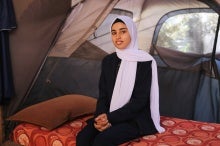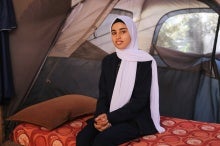“This war has irreversibly changed my life. We have been displaced repeatedly, losing my education, my friends. The fear we live with is beyond words.”
Those are the words of Leen Nahal, who at the age of 14 has endured five wars in Gaza and been repeatedly displaced.
“Once, we could buy food, fruits, and clothes; now, eight of us are crammed into a makeshift tent,” she said. “I bear responsibilities I never imagined.”
Nahal was once a top student, even as her friends and classmates left Gaza to continue their education abroad. But since the escalation of the conflict in late 2023, her life has been thrown into upheaval.
“Now, I sit in a tent with all my books, school uniforms, and bag gone. I feel as if I am losing my future, my education, and my childhood,” she said. “My dream is to end this war and become a history teacher, to share the story of Palestine’s history and our unending suffering.”
The war affects all people in Gaza, from young girls like Nahal to elderly women like Thuraya Al Gourani.
“My life has been shaped by displacement,” said Al Gourani, now 85 years old.
“I still remember the day in 1948 as my father hurriedly gathered us to flee our home in Al Faluja, a small village located between Hebron and Gaza, as Israeli militias approached,” she said. “We escaped to Khan Younis, leaving everything behind.”
Since then, Al Gourani has endured seven wars, and recounted how each time her family was displaced, they did not know if their home would still be standing when they returned.
“Each stripped away more of our dignity,” she said. “This current war is the cruelest and most relentless, lasting longer than any before.”
Throughout the devastating war in Gaza, UN Women has heard from women and girls from all walks of life:
Niveen, a paramedic, has continued her work despite losing 80 members of her family in a single day in November 2023. She has been displaced multiple times, and witnessed horrors, from the destruction of Kamal Adwan Hospital to the bombing of an UNRWA shelter where she sought refuge in Jabalia.
Amani, a psychotherapist in the Gaza Ministry of Health, worked to provide comfort to those traumatized by years of conflict. Before the war, she dreamed of securing a scholarship for a Ph.D. programme—but in May 2024, an Israeli airstrike killed Amani and her four children.
Ibtisam, who uses a wheelchair, has been forced to sleep without a proper bed and finds herself unable to move throughout Gaza’s destroyed, impassable roads. She has been separated from her mother, as shelter facilities lack the proper resources to help those with disabilities.
Meanwhile, Palestinian women and girls in the West Bank also face severe challenges and burdens.
Kafa Abu Harb, a 49-year-old widow and mother of three living in the West Bank, described the stark challenges she has faced living under occupation.
“Soldiers invade our homes, stripping us of our privacy, interrogating us, stealing our children in the dead of night with no reason or warrant. This is the reality we live,” she said.
“One of my sons remains imprisoned, without charge, without trial. How can we endure this?”
But while the conditions faced by women and girls in Palestine may be brutal, they have not given up hope.
“We are not asking for much—just the right to live in peace, to breathe without fear,” Abu Harb said. “Palestinian women have borne the brunt of this suffering, yet we are still here. We are still standing. Our strength is all we have left.”

